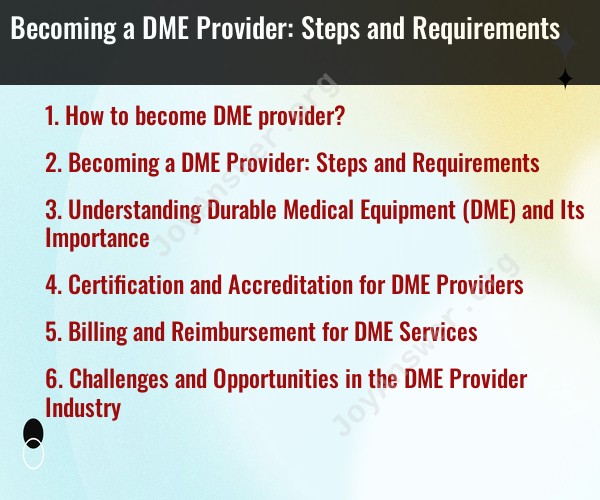How to become DME provider?
Becoming a DME (Durable Medical Equipment) provider involves several steps and requirements to ensure you can legally and ethically provide medical equipment to patients. DME providers play an essential role in the healthcare system by supplying durable equipment and devices to patients and healthcare facilities. Here are the general steps and requirements to become a DME provider:
Research and Planning:
- Research the DME market and identify the specific types of equipment you wish to provide. Consider the demand for these products in your target area.
Business Plan:
- Develop a comprehensive business plan that outlines your business model, budget, and financial projections. Include details on how you plan to market your services and generate revenue.
Legal Structure and Registration:
- Choose a legal structure for your business (e.g., sole proprietorship, LLC, corporation) and register your business with the appropriate government authorities. Obtain the necessary business licenses and permits.
Accreditation and Certification:
- Depending on your location, you may need to obtain accreditation from organizations like the Accreditation Commission for Health Care (ACHC) or the Joint Commission. Accreditation ensures that your business complies with quality and safety standards.
Apply for a National Provider Identifier (NPI):
- Obtain an NPI from the National Plan and Provider Enumeration System (NPPES). An NPI is a unique identifier for healthcare providers and is often required for billing and insurance purposes.
Secure Contracts with Payers:
- If you plan to work with insurance companies, Medicare, or Medicaid, you will need to secure contracts with these payers. This process can be complex and may require meeting specific requirements and standards.
Compliance with Regulations:
- Familiarize yourself with federal and state regulations governing the provision of DME. Ensure your business adheres to compliance standards related to equipment quality, patient privacy (HIPAA), and billing practices.
Inventory and Suppliers:
- Establish relationships with equipment suppliers or manufacturers. Maintain an inventory of the DME you plan to provide. Ensure that the equipment meets safety and quality standards.
Staffing and Training:
- Hire staff, including trained professionals, such as respiratory therapists or equipment technicians, who can assist with patient education and equipment setup. Ensure they receive appropriate training.
Billing and Coding:
- Learn about medical billing and coding for DME. Familiarize yourself with the Healthcare Common Procedure Coding System (HCPCS) codes, which are used to identify and bill for specific DME items.
Patient Education and Support:
- Provide patient education on the proper use and maintenance of DME. Offer support services to patients to ensure they can use the equipment safely and effectively.
Quality Control and Maintenance:
- Implement quality control measures to regularly inspect, maintain, and sanitize DME equipment. Ensure that equipment is in good working condition before providing it to patients.
Business Insurance:
- Obtain appropriate liability and business insurance to protect your business from potential legal and financial risks.
Marketing and Promotion:
- Develop a marketing plan to promote your DME services. Establish a network of referrals with healthcare providers and institutions.
Billing and Reimbursement:
- Establish a system for accurate billing and reimbursement. This includes verifying patient insurance, submitting claims, and following up on payments.
Record Keeping and Documentation:
- Maintain detailed records of patient information, equipment provided, services rendered, and billing information. Ensure compliance with record-keeping requirements.
Ongoing Compliance:
- Stay informed about changing regulations and industry standards. Maintain ongoing compliance with accreditation requirements and regulatory changes.
It's important to note that the specific requirements and regulations for becoming a DME provider can vary by location and can change over time. It's advisable to consult with legal and healthcare professionals who specialize in DME services and regulations to ensure that you meet all the necessary requirements and are operating in compliance with the law.
Becoming a DME Provider: Steps and Requirements
To become a DME provider, you must meet the following steps and requirements:
- Obtain a business license in the state(s) where you plan to operate.
- Enroll as a Medicare DME supplier.
- Obtain DME accreditation from a CMS-approved organization.
- Establish a relationship with a Medicare-approved billing company.
- Develop a business plan and marketing strategy.
Understanding Durable Medical Equipment (DME) and Its Importance
Durable medical equipment (DME) is defined as medical equipment that is necessary for the treatment of a medical condition, is used in the home, and is expected to last at least three years. DME can include a wide range of equipment, such as:
- Hospital beds
- Wheelchairs
- Walkers
- Oxygen tanks
- Nebulizers
- Continuous positive airway pressure (CPAP) machines
- Diabetic testing supplies
- Breast pumps
- Compression stockings
DME is important because it can help people with disabilities or chronic illnesses to live more independently and comfortably. DME can also help to improve patient outcomes and reduce healthcare costs.
Certification and Accreditation for DME Providers
DME providers must be accredited by a CMS-approved organization. Accreditation demonstrates that the provider meets certain standards of quality and care.
There are a number of different organizations that offer DME accreditation. Some of the most common accrediting organizations include:
- Accreditation Commission for Health Care (ACHC)
- The Joint Commission (TJC)
- Community Health Accreditation Partner (CHAP)
Billing and Reimbursement for DME Services
DME providers typically bill Medicare and other insurance companies for their services. Medicare reimburses DME providers at a set rate, which is based on the type of equipment and the patient's medical condition.
To bill Medicare for DME services, you must use a Medicare-approved billing company. Medicare billing companies specialize in billing Medicare for DME services and can help you to ensure that your claims are processed accurately and efficiently.
Challenges and Opportunities in the DME Provider Industry
The DME provider industry is facing a number of challenges, including:
- Increasing competition from online retailers
- Declining reimbursements from Medicare and other insurance companies
- Regulatory changes
However, there are also a number of opportunities in the DME provider industry, including:
- Growing demand for DME services due to the aging population and the increasing prevalence of chronic diseases
- Expanding product offerings to include new technologies and innovative products
- Expanding services to include value-added services, such as patient education and support
Overall, the DME provider industry is a complex and challenging industry, but it is also an industry with a lot of potential.
Additional tips for becoming a successful DME provider:
- Focus on providing high-quality customer service.
- Build relationships with local healthcare providers and referral sources.
- Stay up-to-date on the latest industry trends and regulations.
- Invest in technology to improve your efficiency and productivity.
By following these tips, you can increase your chances of success in the DME provider industry.













